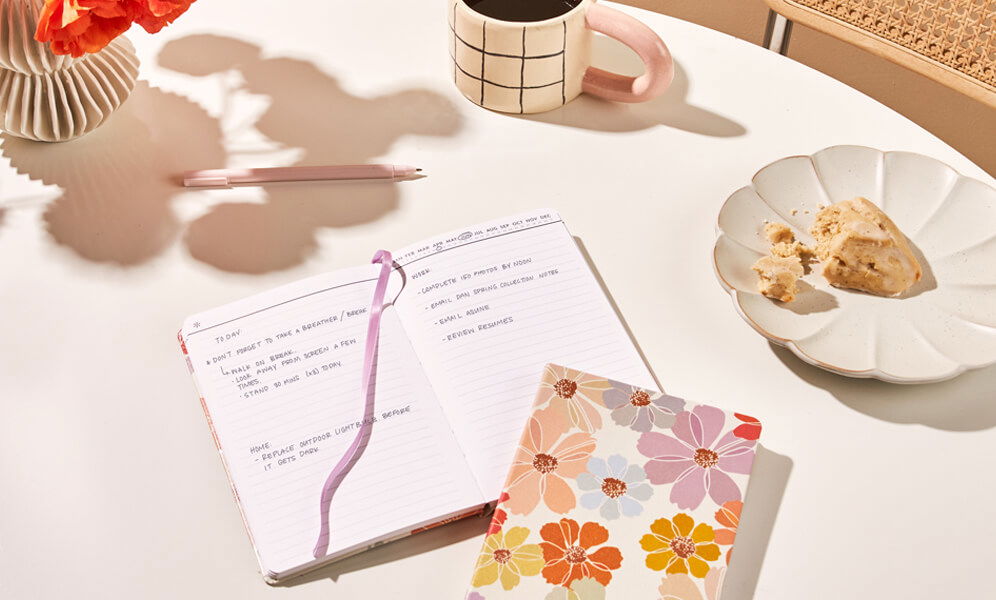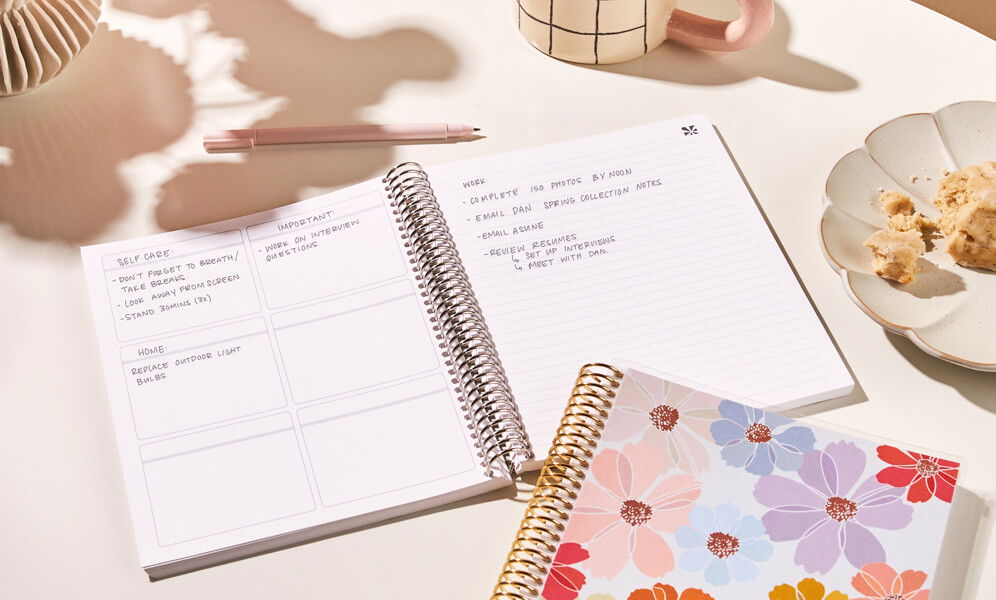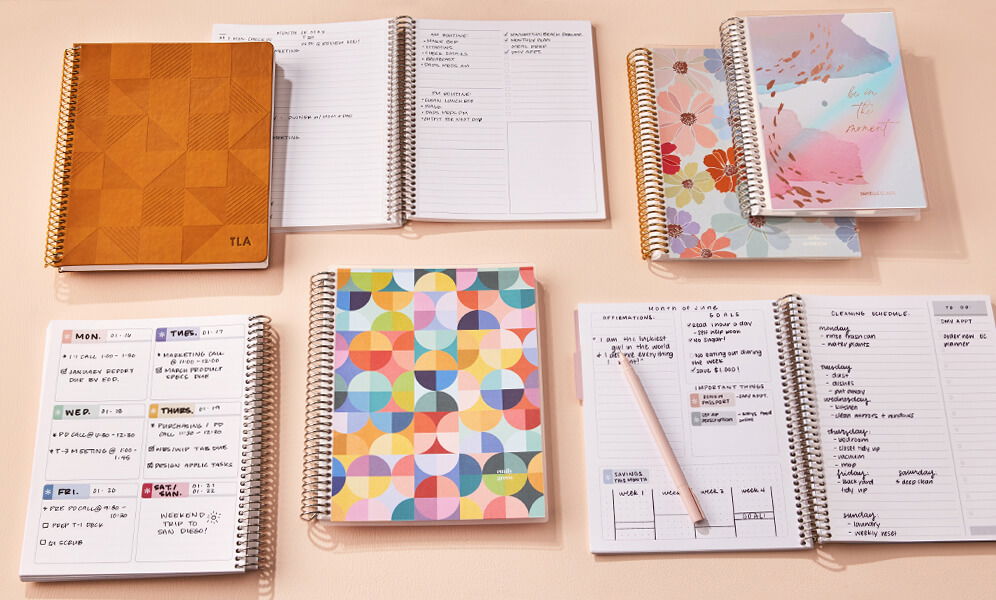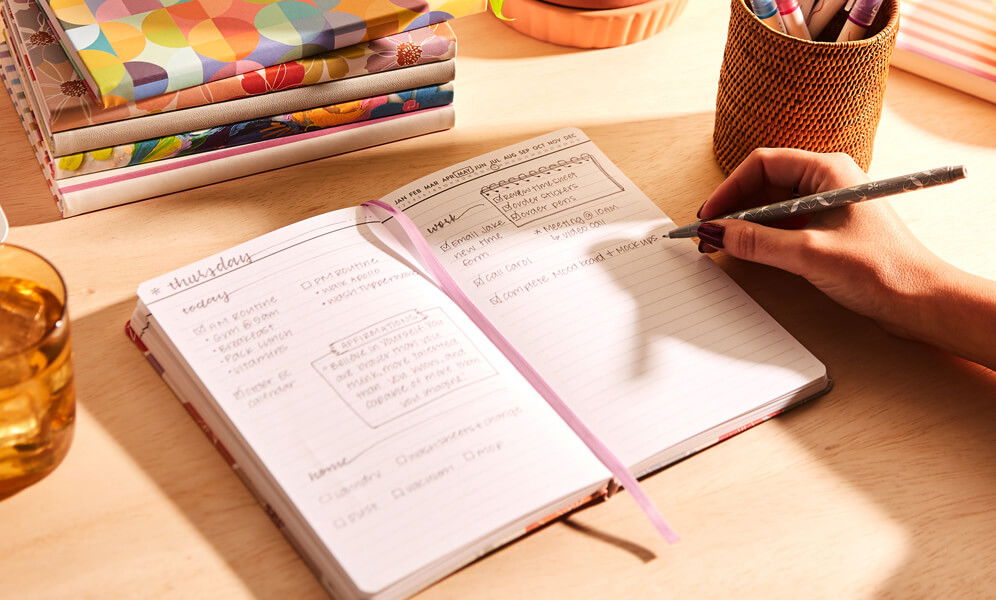The Benefits of a Stress Relief Journal + How to Start One

Journaling is a form of self-care, and it’s trending (for good reason). So many of us are experiencing a surge of feelings and emotions related to turbulent times and all the compounded stress it has caused. In this article, we’ve gathered practical, meaningful tips on how to start a stress relief journal.
What Is a Stress Relief Journal?
A stress relief journal, also known as a stress diary or anxiety journal, is a private and personal space where individuals can express their thoughts, emotions, and experiences related to stress. It serves as an open-access record of their daily struggles, triumphs, and reflections. The concept of journaling for stress management has been around for centuries, and its effectiveness has been validated by stress research and other scientific research.
Why Is a Healthy Outlet for Stress Relief Important?
Managing stress is crucial for our overall well-being. When we experience stress, our bodies enter a "fight or flight" mode, triggering a series of physiological responses. Prolonged exposure to stress can have detrimental effects on our physical and mental health. That's why it's essential to find healthy outlets to cope with stress effectively.
Engaging in stress relief activities helps regulate the stress response and promotes a sense of calm and relaxation. By actively addressing stress, we reduce the risk of developing anxiety disorders, depression, and other stress-related illnesses. A stress relief journal is one such outlet that offers numerous benefits.
The Benefits of Stress Relief Journaling

Journaling is key to any self-care routine and a simple way to reduce stress, improve your immune system, psychophysiology, and long-term well-being. According to an article by the University of Rochester Medical Center, journaling can help you gain control of your emotions and improve your mental health. According to a Huff Post article, journaling can also increase gratitude and mindfulness, improve your memory, help you keep your goals on track, expand your intelligence, and more.
There are so many benefits of writing things down on paper. According to articles and research papers, writing down your feelings can help stop the negative cycle of worry, fear, and escalating anxiety. Studies show that journaling can alleviate anxiety, give you clarity, even improve your physical health, all of which help reduce chronic stress.
Here are more key benefits of keeping a stress relief journal:
Provides a Safe Space for Self-Expression
A stress relief journal provides a safe and judgment-free zone where you can freely express your thoughts and emotions. Writing down your worries and frustrations allows you to release them from your mind, preventing them from spiraling and consuming your thoughts. It serves as a confidant, enabling you to unload your burden and gain a fresh perspective on your challenges.
Helps You Identify Stress Triggers
Journaling can help you identify patterns and triggers that contribute to your stress. By regularly documenting your experiences, you can pinpoint the situations, thoughts, or people that consistently cause stress in your life. Recognizing these stress triggers empowers you to develop effective coping strategies and make necessary lifestyle changes.
To learn more about how to use journaling for stress management, check out How to Start Mindfulness Journaling.
Another way to relieve stress is by combining journaling with a fun fitness routine. Learn more with Creative Fitness Journal Ideas.
Enhances Self-Awareness
Self-awareness is a key component of stress management. Through journaling, you can gain a deeper understanding of your own emotions, behaviors, and thought patterns. As you reflect on your entries, you may notice recurring themes or reactions that shed light on underlying issues. This heightened self-awareness allows you to make conscious choices and respond to chronic stress in a healthier manner.
Helps You Process and Release Emotions
Writing in a stress relief journal can be a cathartic experience. It allows you to process and release pent-up emotions, providing a sense of relief and emotional cleansing. When you write about your fears, anxieties, or frustrations, you externalize them, making them more manageable. The act of putting your thoughts into words can be incredibly therapeutic, offering a healthy release valve for emotional tension.
How to Start a Stress Journal
All you need is paper and something to write with. Then, write whatever’s on your mind as if no one will ever read it (because they won’t—it’s just for you). That’s the simple part. The hard part is learning how to journal consistently. Most of us struggle with sticking with journaling once we’ve started, and that’s okay—now’s your chance to start up again. Whether you’re a journaling beginner or a lapsed pro, here are our top tips for getting started and sticking with it.
Choose a Stress Journal That Inspires You.

Select a journal that resonates with you. It could be a simple notebook, a beautifully designed journal, or even an electronic journaling app. The important thing is to choose a format that motivates and inspires you to write regularly.
Set Aside Time to Write Daily.
Make a commitment to write in your stress journal every day, even if it's just for a few minutes. Set aside a specific time that works for you, whether it's in the morning, during lunch breaks, or before bed. Consistency is key to reaping the benefits of journaling.
Create a Comfortable Writing Space.
Find a quiet and comfortable space where you can focus and reflect. It could be a cozy corner in your home, a tranquil park bench, or a local café. Experiment with different environments to discover what works best for you.
Try Stress Journal Writing Prompts.
If you're unsure where to start, consider using writing prompts to jumpstart your journaling practice. Writing prompts can range from specific questions about your day to broader topics such as gratitude, self-reflection, or future goals. They can help stimulate your thoughts and encourage deeper exploration of your emotions.
Getting the Most Out of Journaling for Stress Relief
To maximize the benefits of stress relief journaling, keep the following tips in mind:
Write Consistently.
Consistency is vital when it comes to journaling. Aim to write in your stress journal regularly, ideally every day. Make it a habit, just like brushing your teeth or exercising. By making journaling a part of your routine, you create a dedicated space for reflection and self-care.
Be Honest.
Honesty is crucial when journaling for stress relief. Allow yourself to be vulnerable and authentic in your writing. Don't censor your thoughts or emotions. Embrace the rawness of your experiences, as it is through honesty that true self-discovery and healing can occur.
Review Your Entries Regularly.
Take time to review your previous journal entries periodically. Look for patterns, insights, and progress in your journey. Reflecting on your past experiences can provide valuable lessons and reinforce your growth. It also serves as a reminder of how far you've come in managing stress.
Create Journaling Accountability.
Sharing your goals and intentions can create accountability that helps you follow through. However, it can backfire if you choose to share it with the wrong people. You’re more likely to stick to your journaling intention if you share it with someone you trust and admire.
For more ways to reduce chronic stress and increase your self-care, check out Best Self-Care Tips and Tools.
Use Time-Blocking for Journaling.
How often have you had the best intentions of journaling, working out, or prioritizing your self-care, but you just didn’t have time for it? (We’ve all been there … often.) That’s where the power of writing it in your planner or calendar comes in. When you block off time to journal, you make it a natural part of your day, and you're more likely to do it. Way to prioritize your self-care!

Did you know planning on paper is also a highly effective stress management technique and that our planners are also part journals? Learn more with How to Use a Planner to Manage Stress.
Create a Journaling Trigger.
According to researchers and research papers reported by NPR, a great way to form a good habit like journaling is to create a habit trigger. A journaling habit trigger can be as simple as linking it with something pleasant you experience on a daily basis. For example, if you take a break every afternoon to enjoy your favorite beverage, try journaling around that existing habit. You can also link it to a time of day like just before bedtime. Explore a bit and find what works best for you. Before long, journaling will become an effortless, automatic practice.
Keep It Short and Sweet.
It’s so easy to go overboard and wear out your motivation when trying something new and rewarding. To ease into a sustainable journaling habit, start with just a sentence or two. Whatever’s on your mind at that moment, jot it down, set it down, and move on. Try this for a minute or so every day. Once you get into a rhythm, you may find yourself writing a paragraph, a page, or more without even realizing it. Until then, keep it short and sweet.
Jumpstart journaling with guided or prompted journals.
If you find it hard to get started or just don’t know what to write, consider getting a guided journal with prompts that fit your current goals and lifestyle. For example, if you want to tap into the power of daily gratitude, try a gratitude notebook with prompts that make it easy to write and develop an attitude of gratitude. Same goes with self-care, health and wellness, even goal setting. There are guided journals for all of that good stuff and more.
Remember, a stress relief journal can be a powerful tool for managing chronic stress and promoting well-being. It offers a safe space for self-expression, helps identify stress triggers, enhances self-awareness, and facilitates the processing and release of emotions. By starting your own stress journal and following these tips, you can harness the benefits of journaling and develop effective stress management strategies. Make journaling a part of your daily routine and witness the positive impact it has on your life.
Ready to begin your journaling journey? Start with a new journal or notebook that inspires you!
Related Journaling Guides
You may also enjoy these other popular, guided journaling tips, prompts, and inspiration from our experts:
- How to Start Mindfulness Journaling + Why You Should
- Journaling for Mental Health + Where to Start
- Exploring Faith Through Journaling: How to Start a Faith Journal
- How to Start a Gratitude Journal and Unlock the Power of Positivity
- 8 Life-Changing Benefits of Journaling Before Bed + How to Start
- Journaling for Anxiety: How to Start
- 11 Breakup Journal Prompts to Overcome Heartbreak
- Meditation Journaling: Elevate Your Practice with Daily Reflections
- How to Use a Line a Week Journal: A Comprehensive Guide + Prompts
- 30 Art Journal Prompts for Relaxation and Creativity